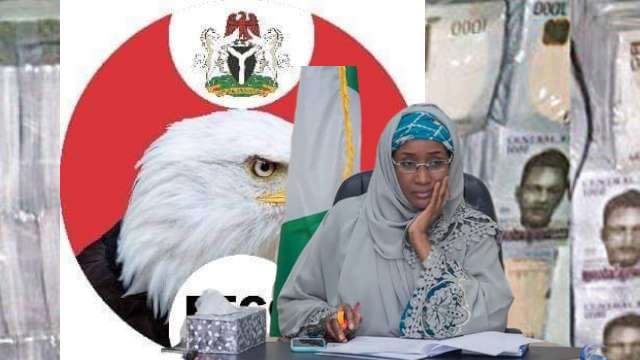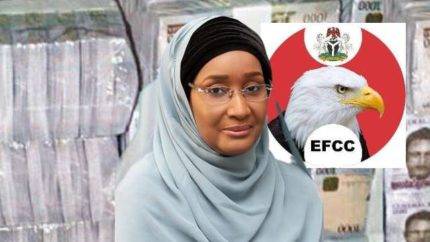Ministry of Humanitarian Affairs Under Scrutiny
The Economic and Financial Crimes Commission (EFCC) has exposed a staggering sum of N37.1 billion believed to have been laundered within the Ministry of Humanitarian Affairs during the tenure of former minister Sadiya Umar-Farouk appointed by former President Muhammadu Buhari in July 2019. Exclusive details obtained by Sunday PUNCH shed light on the illicit transactions that have triggered a comprehensive investigation.
The funds in question were reportedly transferred from the Federal Government’s coffers to 38 different bank accounts in five legacy commercial banks. The focus of the probe centers on the alleged involvement of a contractor, James Okwete, who is linked to these transactions.
As the Ministry of Humanitarian Affairs comes under intense scrutiny, questions arise about the management and oversight of government funds. The ongoing investigation aims to uncover the full extent of the financial irregularities and bring those responsible to justice.
Okwete’s Lavish Lifestyle Funded by Illicit Gains from Ministry of Humanitarian Affairs
James Okwete, the central figure in this unfolding scandal, is accused of channeling the laundered funds into various extravagant ventures, exposing a web of corruption within the government system.
Okwete purportedly transferred a significant portion of the funds to Bureau De Change Operators, withdrew substantial sums in cash, and indulged in the purchase of luxury cars. These revelations underscore the audacity with which the alleged corruption unfolded.

The scandal takes a more egregious turn as Okwete is said to have utilized the illicit gains to acquire luxury houses in Abuja and Enugu State. The EFCC’s investigation aims to unravel the intricate network of financial activities that enabled such blatant misuse of public funds.
Network of Companies and Federal Contracts Through Ministry of Humanitarian Affairs
The complexity of the scandal deepens as investigators uncover a multitude of companies linked to James Okwete, raising questions about the integrity of the government procurement process.
Shockingly, 53 companies are allegedly tied to Okwete, with indications that 47 of these entities were used to secure Federal Government contracts amounting to a staggering N27.4 billion. This revelation highlights the need for a thorough review of the contracting procedures within government ministries.
The investigation aims to scrutinize the relationships between Okwete and the multitude of companies involved, bringing attention to potential loopholes and vulnerabilities in the system that allowed such a vast misuse of public funds.
Extensive Bank Accounts and Corporate Connections
As the probe unfolds, a concerning number of bank accounts and corporate entities associated with James Okwete come to light, exposing the magnitude of the financial web spun within the Ministry of Humanitarian Affairs.
Okwete is allegedly linked to a staggering 143 bank accounts across 12 commercial banks, with 134 of these accounts being corporate accounts tied to different companies. This revelation raises questions about the efficacy of existing financial monitoring systems.
The EFCC‘s focus on the extensive network of accounts and corporate connections aims to understand how such a vast array of financial transactions went unnoticed, emphasizing the urgency for strengthened regulatory measures to prevent future occurrences.

Political Ramifications and Public Outcry
The unfolding scandal is sending shockwaves through the political landscape, with citizens demanding accountability and transparency from government officials.
As details of the financial scandal become public, there is a growing sense of public outrage and demand for swift action against those implicated. The political fallout from this revelation could have significant ramifications for the reputation of the Ministry of Humanitarian Affairs and the broader government.
The scandal adds fuel to the ongoing discourse about corruption within government institutions, prompting calls for systemic reforms and heightened vigilance to prevent similar incidents in the future. The political implications of this scandal are likely to reverberate in the coming weeks.
EFCC’s Commitment to Justice
The EFCC assures the public of its unwavering commitment to ensuring that those responsible for the alleged financial mismanagement face the full force of the law.
In a statement, the EFCC emphasizes its dedication to a thorough and impartial investigation, promising to bring all individuals involved in the financial scandal to justice. The commission’s role in uncovering such corruption reflects its mandate to safeguard public funds and maintain the integrity of government institutions.
As the investigation progresses, the EFCC encourages citizens to have confidence in the justice system and pledges to keep the public informed about developments in the case. The outcome of this probe is anticipated to set a precedent for accountability within government agencies, reinforcing the importance of transparency and accountability in public service.
Table of Contents
Discover more from OGM News NG
Subscribe to get the latest posts sent to your email.














